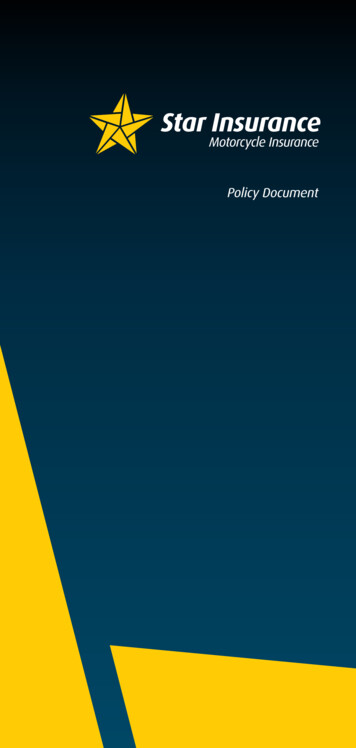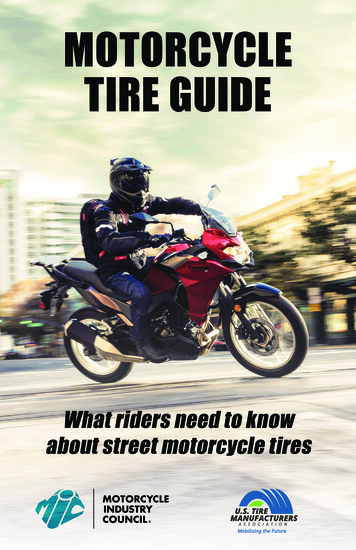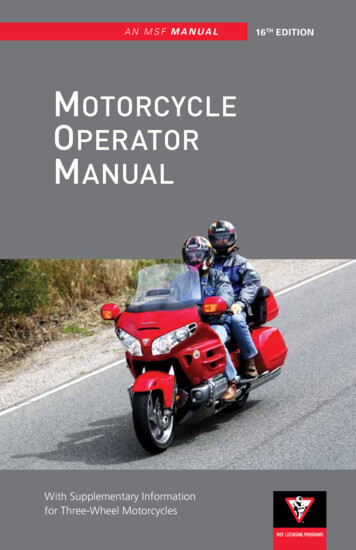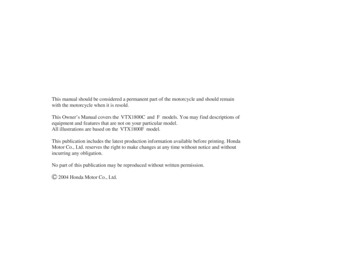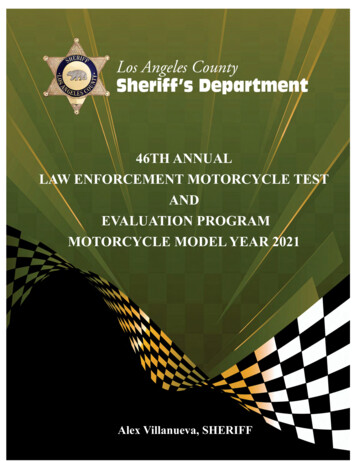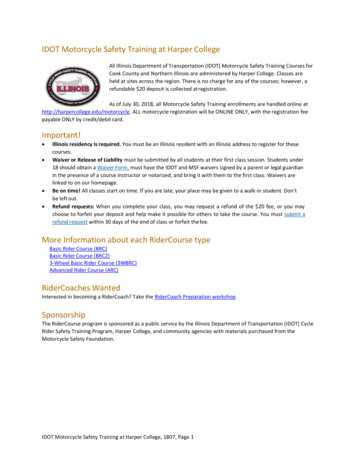
Transcription
IDOT Motorcycle Safety Training at Harper CollegeAll Illinois Department of Transportation (IDOT) Motorcycle Safety Training Courses forCook County and Northern Illinois are administered by Harper College. Classes areheld at sites across the region. There is no charge for any of the courses; however, arefundable 20 deposit is collected at registration.As of July 30, 2018, all Motorcycle Safety Training enrollments are handled online athttp://harpercollege.edu/motorcycle. ALL motorcycle registration will be ONLINE ONLY, with the registration feepayable ONLY by credit/debit card.Important! Illinois residency is required. You must be an Illinois resident with an Illinois address to register for thesecourses.Waiver or Release of Liability must be submitted by all students at their first class session. Students under18 should obtain a Waiver Form, must have the IDOT and MSF waivers signed by a parent or legal guardianin the presence of a course instructor or notarized, and bring it with them to the first class. Waivers arelinked to on our homepage.Be on time! All classes start on time. If you are late, your place may be given to a walk-in student. Don'tbe left out.Refund requests: When you complete your class, you may request a refund of the 20 fee, or you maychoose to forfeit your deposit and help make it possible for others to take the course. You must submit arefund request within 30 days of the end of class or forfeit the fee.More Information about each RiderCourse typeBasic Rider Course (BRC)Basic Rider Course (BRC2)3-Wheel Basic Rider Course (3WBRC)Advanced Rider Course (ARC)RiderCoaches WantedInterested in becoming a RiderCoach? Take the RiderCoach Preparation workshop.SponsorshipThe RiderCourse program is sponsored as a public service by the Illinois Department of Transportation (IDOT) CycleRider Safety Training Program, Harper College, and community agencies with materials purchased from theMotorcycle Safety Foundation.IDOT Motorcycle Safety Training at Harper College, 1807, Page 1
Frequently Asked Questions Which course should I take?o First, identify your objectives: If you have limited or no riding experience, then you should take the Basic RiderCourse(BRC). If you have some level of riding experience and either need to get licensed or simply wantmore coached practice, then the Basic RiderCourse2 (BRC2) may be the class you want. TheBRC and BRC2 are the only classes that provide a waiver of the state riding and written tests. If you wish to learn to ride a 3-wheel motorcycle, the 3-Wheel Basic RiderCourse (3WBRC) isthe course you want. If you own your own motorcycle, have a motorcycle license, and want to get some practicewith it and learn more about safety, then the Advanced RiderCourse (ARC) is probably thebest fit for you. Where are the classes offered?o The Motorcycle Safety Program offers classes at locations throughout Northern Illinois. All locationsare administered through Harper College, so if you have any questions or need to speak to someoneabout the program, please contact Harper College Motorcycle Safety Program office at 847-9256803. DO NOT try to contact any of the individual training sites; they only provide the program withthe facilities to run classes at their campus. How much do the courses cost?o All courses are free of charge but do require a 20 refundable deposit to hold your seat in a class. Youmay request a refund of the 20 deposit within 30 days of the completion of the class, though manystudents choose to forfeit their deposit so that we can continually improve the program. Can I take the course as a walk-in? Do I have to register ahead of time?o We are not currently accepting walk-in students due to current COVID protocols, so you must preregister for a course.o The best way to make sure you get the course you want is to register ahead of time. If you try toregister and see that the course you want is full, check back prior to the scheduled date to see if a spacehas opened up. If you are unsuccessful in finding an open seat, you may wish to try the walk-in option.Just show up at the course location at least 15 minutes prior to the listed start time of the first classmeeting. Notify the instructor that you would like to attend as a walk-in. At the course starting time, alottery will determine which walk-in students will be assigned to anyunclaimed seats. Am I eligible to take the class?o You must be at least 16 years of age, be either a temporary or a permanent resident of Illinois, andpossess a valid learner’s permit or license (including a TVDL) for some form of motor vehicle. Forriders with at least a year of riding experience, and who have their own motorcycle and hold a validmotorcycle license, we offer an Advanced RiderCourse (ARC). Do I need a motorcycle?o For the BRC), BRC2, and 3WBRC our program provides motorcycles, helmets, insurance, and professionalinstruction. You may opt to bring your own standard three-wheel motorcycle to a 3WBRC (see conditionsbelow). For the ARC, you must provide your own motorcycle. Do I need to wear protective clothing?o All classes require that you wear protective clothing. Helmets will be provided for BRC, BRC2, and3WBRC courses, but students are welcome to bring their own DOT-approved three-quarter or fullface helmets. You must provide your own DOT-approved helmet for the ARC course. The followingitems are required without exception: sturdy, over-the-ankle footwear (not cloth or canvas, bootssuggested), long pants free of holes (sturdy material, like denim), long-sleeve shirt or jacket, glovesIDOT Motorcycle Safety Training at Harper College, 1807, Page 2
that cover the entire hands, protective eyewear (any type of glasses that can be worn while operatinga motorcycle/driving). What if I don’t show up on time for class, or I’m late?o If you are late for any course session, including the first one, you will not be admitted to the courseand your seat may go to a walk-in student. Our lessons and riding exercises are built on a buildingblock principle, meaning that each lesson or riding exercise builds on what came before them. I had to miss part of my course. Can I finish up with another class?o No, you will need to register for another course and attend it from start to finish. Do I get a motorcycle license when I’m done with the class?o No, you must go to the Secretary of State’s office to get your new license. If you are 18 or over andsuccessfully complete the BRC) or BRC2, your course Completion Card will waive both the riding andwritten tests at the Secretary of State's office. If you successfully complete a 3WBRC you will receive aCompletion Card that will waive both the riding and written tests at the Secretary of State’s office for aJ-11 restricted license for three-wheel motorcycles only. If you are 16 or 17 years of age and successfullycomplete a course, you will receive a Completion Card that will allow you to apply for an M (or J-11, for3WBRC) Class license and allow you to test at the Secretary of State's office. What is covered in the classes?o Basic riding skills such as starting, stopping, turning, and shifting. Strategies for street riding. Advancedtechniques in turning, braking, and swerving. Our curriculum was developed by the Motorcycle SafetyFoundation. See http://www.msf-usa.org for more information. What if I’m not really interested in buying a motorcycle?o Non-motorcyclists can benefit from these courses by learning on a first-hand basis what a motorcyclistexperiences and the necessity for developing respect for all vehicles on the highway. This is also a greatway to find out if you will like riding motorcycles without having to purchase one. How long are the classes?o The BRC) includes 20 hours of instruction with different schedules that vary by location. Check thespecific information for your course to plan your schedule. The BRC2 includes 12 hours of instruction,usually a weekday evening plus a Saturday or Sunday. The 3WBRC includes 18 hours of instructionand may be offered on weekdays or weekends depending on the location. The ARC includesapproximately eight hours of instruction, usually 9 a.m. - 6 p.m. on Saturday or Sunday. What if it rains?o Our classes meet rain or shine, so if it rains, bring rain gear. If lightning or other weather develops thatpresents a safety risk, the instructor may cancel class or modify its schedule somewhat. What if I have a disability?o If you have a disability, please contact our office at 847-925-6803 prior to making your courseselections to discuss available accommodations. Do I have to take this course to get my license?o No, you do not have to take a Rider Course to get your license if you are 18 or older. However, if you are16 or 17 years old and wish to obtain an "M" or “J-11” class motorcycle license, you are required bythe state to successfully complete a Rider Course to be eligible to test at the DMV. Do I need to have my motorcycle permit prior to taking the course?o No. Any valid driver's license or permit will meet the requirements for taking the BRC or 3WBRCcourse. Any valid driver’s license or permit plus riding experience (the ability to start, stop, shift,and turn) will meet the requirement to take the BRC2 course. To attend the ARC, you must hold avalid motorcycle license.IDOT Motorcycle Safety Training at Harper College, 1807, Page 3
Do I have to bring my own helmet for the course?o Only if you're attending the ARC. We provide helmets for the BRC, BRC2, and 3WBRC courses.However, you are welcome and encouraged to bring your own DOT-approved helmet if it is of thethree-quarter or full-face variety. What size are the motorcycles used in the courses?o Small. The smallest course motorcycles are 200 –250 cc. How soon will I get information about the course I’m in?oCommunication about the courses is through email for students who registered online.Please make sure the e-mail address you enter when you register is correct and current.You should receive an immediate e-mail confirmation upon registration and payment of the 20 refundable fee. How can I find out when a course re-opens due to cancellations?o Our registration system runs in real-time. If a student withdraws from a course, our website will reflectthat availability immediately. Please check often to find out if a seat becomes available. What is the best way to find an open course?o Use the “Search for Courses” function near the top of our homepage and enter “motorcycle” asyour search keyword on the search page. Any course section with an open seat will be returned inthe search results When will I get my completion card so I can obtain my motorcycle license if I successfully complete the course?o The course Completion Card can take up to 4 weeks after your course to process and mail. We donot offer an expedited card service as completion paperwork must go through several stages ofchecks and double checks. What do I do with my Completion Card once I receive it?o You have one year from the completion of your Rider Course to obtain your motorcycle license. If you are18 or older and have completed a Rider Course, the Secretary of State's Driver Services Facility will waivethe written and riding portions of your exams. If you are 16 or 17 years old, the Completion Card isrequired to take the test for an M (or J-11 restricted) Class license. In addition to the testing waivers,many insurance companies offer discounted rates for successfully completing one of our courses. Checkwith your insurance agent. What if I have additional questions?o Please send an email to motorcycles@harpercollege.edu.IDOT Motorcycle Safety Training at Harper College, 1807, Page 4
Basic RiderCourse (BRC)The Basic RiderCourse (BRC) provides approximately 20 hours of classroom and on-motorcycle instruction. In thiscourse, you will develop and practice four fundamental riding skills: Straight-line riding Turning Shifting StoppingOnce the basic skills are honed, you will expand into street-riding skills, including: Advanced turning techniques Advanced braking techniques SwervingYou will also learn and practice the mental skills needed to develop street-riding strategies and the ability tonavigate special situations.Basic RiderCourse EligibilityAny Illinois resident (16 years of age or older) who holds a valid driver's license or permit is eligible to register forMotorcycle Rider Courses. All students must submit a signed Waiver or Release of Liability form at their firstclass session. Students under 18 should obtain a Waiver Form, have it signed by a parent or guardian, and bring itwith them to the first class. Download the Waiver Form.Protective Clothing Requirements: What You Need to BringIn addition to the waiver mentioned above (if under 18), participants should bring protective clothing. The followingitems are required without exception: sturdy, over-the-ankle footwear (not cloth or canvas, boots suggested) long, sturdy pants free of holes (like denim) long-sleeve shirt or jacket gloves that cover the entire hands protective eyewear (any type of glasses that can be worn while operating a motorcycle/driving)Helmets and motorcycles will be provided. Students are welcome to bring their own DOT-approved 3/4 or full-facehelmets.LicensingA BRC Completion Card will be mailed to all students who have successfully completed the Basic Rider Course. TheBRC Completion Card will enable the Secretary of State motorcycle written and driving tests to be waived forthose 18 years of age and older. Persons age 16 or 17 must complete this course to be eligible for the "M" classmotorcycle endorsement.IDOT Motorcycle Safety Training at Harper College, 1807, Page 5
Basic RiderCourse (BRC2)The BRC2 is designed for riders with previous experience who are returning to motorcycling or who have ridden forsome time without a license. They may be returning riders who already passed the BRC but don't have their ownmotorcycle or would like additional training and practice before riding on the street, or experienced dirt bike riderswho want to start riding on the street.This course offers an overview of the fundamentals of safe, responsible motorcycling and provides riders theopportunity to renew skills and acquire important knowledge for safe street operation. The BRC2 provides atraining experience for riders who already have basic operational skills including motorcycle controls operation,straight- line riding, upshifting, downshifting, turning, braking and stopping.The BRC2 consists of 12 hours of classroom and on-motorcycle instruction (motorcycles and helmetsprovided), including riding and written evaluations.BRC2 Eligibility Illinois residents who are at least 18 years of age (on the first day of their course) are eligible to enroll in the BRC2 if they have a valid driver's license or instruction permit and have previous experience operating amotorcycle.Prerequisites: All BRC2 students are expected to possess reasonable proficiencies in basic motorcycle controloperation, straight-line riding, upshifting, downshifting, turning, braking, and stopping prior to enrolling inthe BRC2. Those unable to demonstrate these minimum expectations during the first riding sessions will notbe allowed to continue in the BRC2 course, nor will they be given preferential enrollment into a basiccourse.Protective Clothing Requirements: What You Need to BringParticipants should bring protective clothing. The following items are required without exception: sturdy, over-the-ankle footwear (not cloth or canvas, boots suggested), long, sturdy pants free of holes (like denim) long sleeve shirt or jacket gloves that cover the entire hands protective eyewear (any type of glasses that can be worn while operating a motorcycle/driving)Helmets and motorcycles will be provided. Students are welcome to bring their own DOT-approved 3/4 or full-facehelmets.LicensingA Completion Card will be mailed to all students who successfully complete the BRC2. The Completion Card willenable the Secretary of State motorcycle written and driving tests to be waived for those 18 years of age and older.IDOT Motorcycle Safety Training at Harper College, 1807, Page 6
3-Wheel Basic RiderCourse (3WBRC)The 3-Wheel Basic RiderCourse (3WBRC) provides approximately 16 hours of classroom and on-motorcycleinstruction. In this course, you will develop and practice four fundamental riding skills: Straight-line riding Turning Shifting StoppingOnce the basic skills are honed, you will expand into street-riding skills, including: Advanced turning techniques Advanced braking techniques SwervingYou will also learn and practice the mental skills needed to develop street-riding strategies and the abilityto navigate special situations.3WBRC EligibilityAny Illinois resident (16 years of age or older) who holds a valid driver's license or permit is eligible to registerfor Motorcycle Rider Courses. All students must submit a signed Waiver or Release of Liability form at theirfirst class session. Students under 18 should obtain a Waiver Form, have it signed by a parent or guardian, andbring it with them to the first class. Download the Waiver Form.Protective Clothing Requirements: What You Need to BringIn addition to the waiver mentioned above (if needed), participants should bring protective clothing. Thefollowing items are required without exception: sturdy, over-the-ankle footwear (not cloth or canvas, boots suggested) long, sturdy pants free of holes (like denim) long-sleeve shirt or jacket gloves that cover the entire hands protective eyewear (any type of glasses that can be worn while operating a motorcycle/driving)Helmets and motorcycles will be provided. You may choose to bring your own standard three-wheel motorcycle.(Automotive hybrids/conversions, front/rear mounted engines, or vehicles with enclosed/semi-enclosed seatingwill not be allowed.) Students are welcome to bring their own DOT-approved 3/4 or full-face helmets.LicensingA 3WBRC J-11 restricted Completion Card will be mailed to all students who have successfully completed the 3Wheel Basic Rider Course. The 3WBRC Completion Card will enable the Secretary of State motorcycle written anddriving tests to be waived for those 18 years of age and older. A license (J-11 restricted) obtained with thiscompletion card is valid for three-wheel motorcycles only. Persons age 16 or 17 must complete this course to beeligible for the M class with J-11 restriction motorcycle endorsement.IDOT Motorcycle Safety Training at Harper College, 1807, Page 7
Advanced RiderCourse (ARC)In the eight-hour ARC course, participants will: Increase skills, knowledge, safety awareness and enjoyment Become familiar with motorcycle dynamics, survival strategies, emergency braking, countersteering, andtraction availability Practice precise steering techniques and correct braking methods under controlled conditions withMotorcycle Safety Foundation Certified RiderCoaches Gain the knowledge necessary for further development of safe riding skillsARC EligibilityARC students must: provide their own street-legal motorcycle or have the owner's written permission to use a borrowedstreet-legal motorcycle have a motorcycle endorsement to ride the motorcycle used in the ARC complete a waiver form and motorcycle safety inspection checklist (forms provided) show proof of motorcycle insurance at first class meetingProtective Clothing Requirements: What You Need to BringParticipants should bring protective clothing. The following items are required without exception: sturdy, over-the-ankle footwear (not cloth or canvas, boots suggested)long, sturdy pants free of holes (like denim)long sleeve shirt or jacketgloves that cover the entire handsprotective eyewear (any type of glasses that can be worn while operating a motorcycle/driving)DOT-approved helmet (must be at least 1/2-shell helmet; 3/4 or full-face helmets recommended)LicensingA valid motorcycle license is required to take the ARC. An Advanced RiderCourse Completion Cardwill be issued to students who complete the entire course. The ARC Completion Card does not waivethe test requirements for obtaining a motorcycle license through the Secretary of State.IDOT Motorcycle Safety Training at Harper College, 1807, Page 8
RiderCoachesThe Harper College Motorcycle Safety Program is looking for service-minded individuals to join our part-time staffof Rider Coaches. The level of responsibility is high, but the satisfaction of assisting other people as they improvetheir mental skills, physical coordination, and life-saving driving strategies is extremely rewarding! All RiderCoaches have completed a RiderCoach Preparation Course (RCP) and maintain current certification credentialsthrough the Motorcycle Safety Foundation.RCP Workshop applications are selectively accepted from individuals who: are at least eighteen years of age have excellent verbal and written communication skills have excellent social skills with a strong interest in helping other people have an Illinois class "M" motorcycle operator license or equivalent from another state have completed a basic motorcycle rider course currently operate a motorcycle on a frequent basis have a clean driving record with no possibility for license suspension or revocation.Please note: an original driving abstract issued by any Illinois Drivers Services Facility or your home state'sDepartment of Motor Vehicles must be attached to your application.Candidates accepted into the RCP must successfully complete: an initial riding skills test to demonstrate riding proficiency a 70 hour classroom/riding instruction course conducted by MSF certified RiderCoach Trainers a written knowledge test covering the novice course curriculum a student teaching phase to demonstrate communication abilities and proficiencies at evaluating andcoaching novice students MSF RiderCoach Certification Agreement/Rules of Professional ConductOnce certified, a RiderCoach must: attend annual region-specific updates maintain first-aid certification through an approved provider Meet requirements as set by the curriculum provider to maintain a valid certification Maintain contact with the program office as requiredBecause certain areas of our training region are understaffed, and enrollment in these courses is limited, wereserve the right to select course candidates geographically. The intensity of this training may exceed that of anyprevious instruction in which you have been involved. Your commitment will require much more time than theactual contact hours listed in the course schedule and, once enrolled, there is no guarantee that you willsuccessfully complete the course. Course materials will be provided prior to the first course session. Ifsuccessful, all teaching materials will be yours to keep. If you do not complete the RCP for any reason, thematerials must be returned. Travel and incidental expenses will be the responsibility of the candidate.If you are interested in becoming a RiderCoach for the Harper College Motorcycle Safety Program or would likemore information, please contact us via email at motorcycles@harpercollege.edu or give us a call at 847-9256803.IDOT Motorcycle Safety Training at Harper College, 1807, Page 9
are administered through Harper College, so if you have any questions or need to speak to someone about the program, please contact Harper College Motorcycle Safety Program office at 847-925-6803. DO NOT try to contact any of the individual training sites; they only provide the program with the facilities to run classes at their campus.
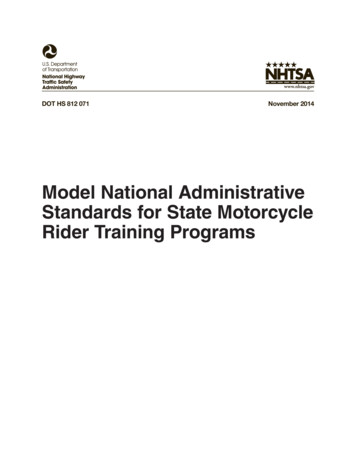
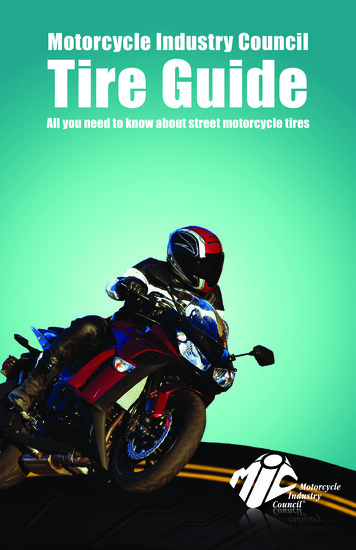
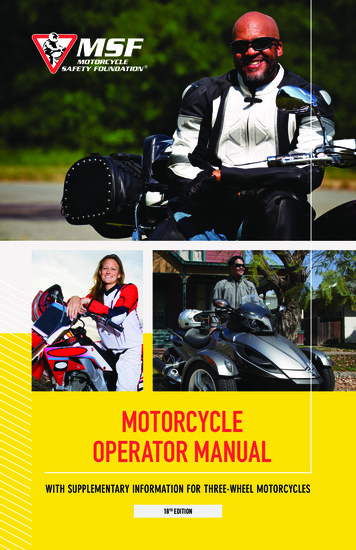
![Motorcycle Mechanic [MM] - CTEVT](/img/5/motorcycle-20-20mechanic-2010.jpg)
